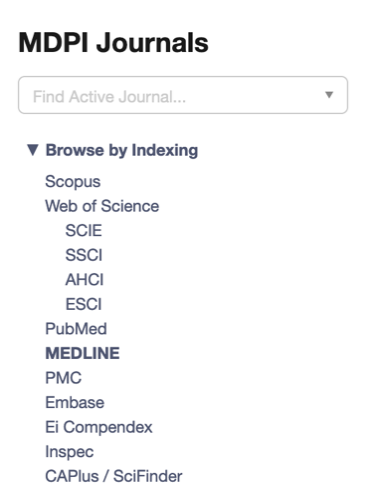
Journal Menu
► ▼ Journal Menu-
- Conservation Home
- Aims & Scope
- Editorial Board
- Topical Advisory Panel
- Instructions for Authors
- Special Issues
- Topics
- Topical Collections
- Article Processing Charge
- Indexing & Archiving
- Editor’s Choice Articles
- Most Cited & Viewed
- Journal Statistics
- Journal History
- Society Collaborations
- Editorial Office
Journal Browser
► ▼ Journal BrowserNeed Help?
Announcements
26 August 2024
Conservation Accepted for Coverage in Scopus

We are pleased to announce that Conservation (ISSN: 2673-7159) was selected for coverage in the Scopus indexing database in July 2024. We would like to extend our sincerest gratitude to all of the authors, reviewers, and editors who have contributed to this journal and helped us to accomplish this achievement.
Conservation is an international, peer-reviewed, open access journal covering all areas of biological, environmental, sociological, ethical, economic, and other transdisciplinary dimensions of conservation, published quarterly online by MDPI. We welcome work focusing on biodiversity and environment conservation, resource recycling conservation and sustainable management, conservation planning and governance, conservation ethics and ecology, creative and multidisciplinary solutions for conservation and restoration, and heritage conservation and restoration. Our aim is to encourage scientists to publish their experimental and theoretical results in as much detail as possible.
We would like to take this opportunity to invite you to submit your research to the journal. We warmly welcome you to consider Conservation as a platform for publishing your work. If you have written a paper covering any topic within the scope of the journal, please submit it via the journal’s website: https://www.mdpi.com/journal/conservation.
19 August 2024
MDPI’s 2023 Young Investigator Awards—Winners Announced

MDPI’s Young Investigator Awards recognize promising early career scientists, acknowledge their contributions, and foster collaboration within the scientific community. We are proud to announce the recipients for 2023, who were carefully selected by the journals’ esteemed Award Evaluation Committee.
We extend our heartfelt congratulations to the 79 winners of MDPI’s 2023 Young Investigator Awards for their excellent contributions in their research field. We look forward to seeing these rising stars continue to contribute to the advancement of science.
MDPI will continue to support and recognize the academic community. To explore details about the awardees by field, please visit the individual pages listed below:
Congratulations to all the winners for their exceptional contributions and dedication to advancing scientific research.
About MDPI Awards:
To support the academic community, particularly young researchers, and to enhance communication among scientists, MDPI journals regularly offer various awards to researchers in specific fields. These awards, serving as a source of inspiration and recognition, help to elevate the profiles of talented individuals who have made outstanding achievements and are making significant contributions to advancements in their respective fields.
To find out more about MDPI awards, please click here.
7 August 2024
MDPI Insights: The CEO's Letter #14 - New Headquarters, Marketing, Poland

Welcome to the MDPI Insights: The CEO's Letter.
In these monthly letters, I will showcase two key aspects of our work at MDPI: our commitment to empowering researchers and our determination to facilitating open scientific exchange.
Opening Thoughts
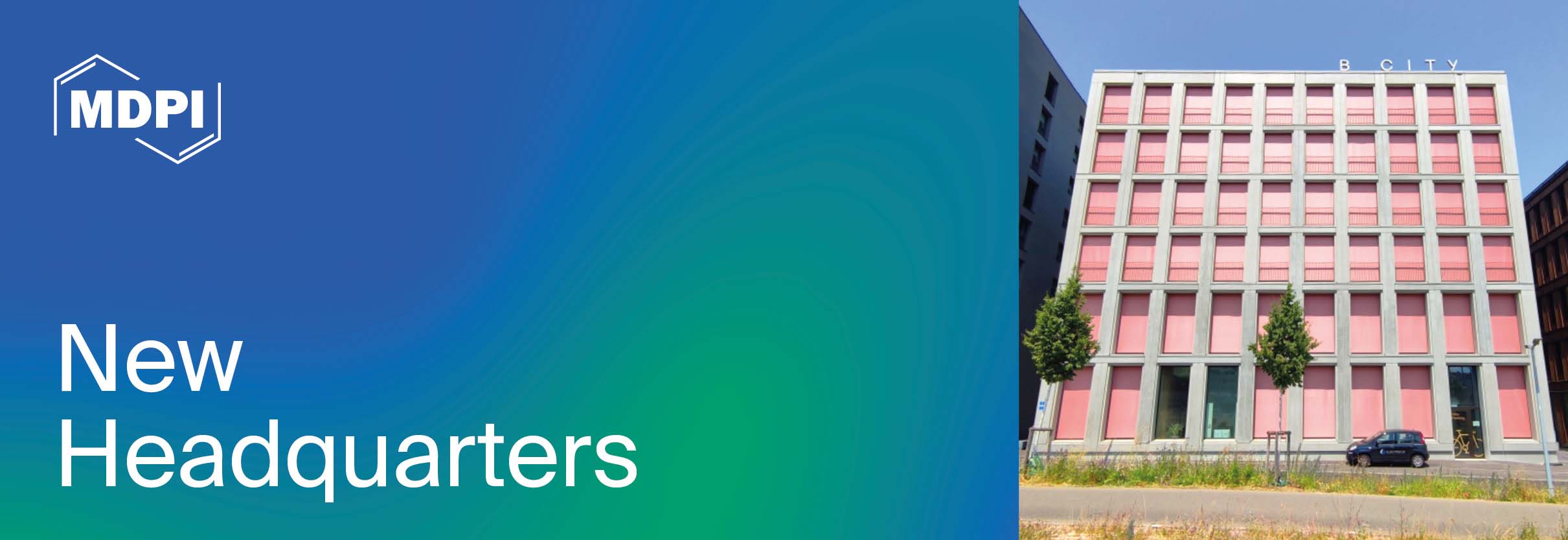
MDPI Moves to New Headquarters in Basel, Switzerland

I am excited to share that MDPI has moved to a new state-of-the-art office space in Basel, Switzerland. This move consolidates our operations by bringing together our two previously separated Basel offices into one central location.
We are always growing our talent pool and encourage you to view our Careers Page for the positions available in Basel and across our offices.
New Address: Grosspeteranlage 5, CH-4052 Basel, Switzerland
Effective Date: 1 July 2024
This new chapter in our company’s journey is designed to continue our mission of positioning MDPI as a leader in Open Access (OA) publishing, highlighting our commitment to making scholarly research accessible to everyone.

Boasting modern amenities, improved meeting and event spaces designed to support our growing needs, the new location provides a more collaborative and efficient working environment for our employees. The location offers convenient accessibility to public transportation and is situated near the Basel SBB railway station, with a variety of nearby services and amenities.
In fact, I can see the trains right outside of my window as I write these lines!
This move marks an exciting milestone in MDPI’s development, and I am confident that the new headquarters will serve as an inspiring and productive space for everyone. We also very much look forward to welcoming visitors here. You can read more about MDPI's history here.
“This new chapter continues our mission of positioning MDPI as a leader in OA publishing”
For Those New to MDPI
A pioneer in scholarly, Open Access publishing, MDPI has supported academic communities since 1996. MDPI is leading the transition to Open Science by making a greater proportion of the research conducted worldwide free and accessible to everyone. To date, over 3.5 million researchers have entrusted MDPI with publishing their scientific discoveries. MDPI’s editorial process is bolstered by a network of dedicated reviewers, a team of 6,000 professional, well-trained staff members, and an in-house article submission platform designed to ensure efficient processes within its 440 fully Open Access titles. MDPI supports more than 800 academic institutions worldwide, helping them adhere to national mandates while facilitating authors’ publication in fully compliant (CC BY) Open Access journals.
Impactful Research
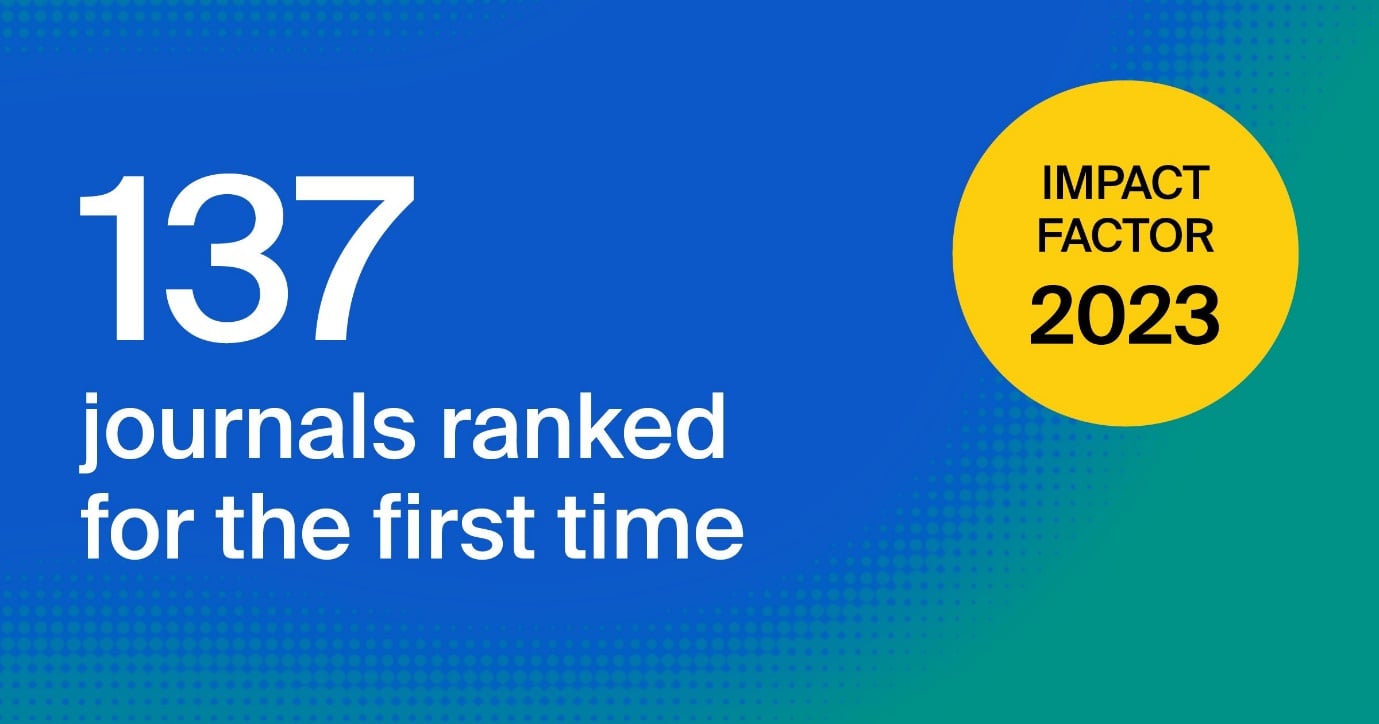
New and Emerging MDPI Journals Making an Immediate Impact
Unpacking some of the Impact Factor updates from the June CEO Letter, I wanted to dive a little deeper into the 137 MDPI journals which received Impact Factor for the first time.
Academic authors highly value efficient publishing processes, robust editorial support, and the opportunity to publish in high-impact journals. We are proud that our newly launched journals typically achieve coverage in the Emerging Sources Citation Index (ESCI) of the Web of Science within just a few years, with a median time of only three years from release to inclusion.
As part of our commitment to advancing academic research and providing high-quality OA publishing, we actively seek new research areas to expand our portfolio of journals. We have a proven track record of successfully establishing new journals.
Our dedicated teams excel in fostering dynamic editorial boards and working closely with Editors-in-Chief (EiC) to define the precise scope and focus of each new journal. Our expertise extends to collaborating with indexing services, ensuring that our journals comply with best practices and are indexed promptly in all relevant databases.
Emerging Titles Ranked for the First Time
Our commitment to excellence is reflected in the annual impact metrics released this past June. The latest edition of the Journal Citation Reports (JCR) showcases the integration of journals from the ESCI in the new unified category rankings, providing a simplified and more complete view of all journals within each subject category, including newly established titles.
Out of 137 new and developing MDPI journals ranked in the 2024 release, 79 are in the top half (Q1 or Q2) of their categories. Here is a breakdown of the number of MDPI’s ESCI-indexed journals by quartile in the JCR:
| Quartile | No. of journals |
| Q1 | 17 (12.4%) |
| Q2 | 62 (45.3%) |
| Q3 | 43 (31.4%) |
| Q4 | 15 (10.9%) |
| Not ranked (humanities-related journals) | 2 |
These rankings highlight our success in rapidly establishing high-impact new journals. Among those that made it directly into the top 25% of their category are the International Journal of Neonatal Screening, Journal of Xenobiotics, Polysaccharides, Smart Cities, and thirteen other journals.
You can browse MDPI journals by Indexing. Simply visit our Journals page and select from the list of Indexing bodies in the top left-hand corner.
Inside MDPI

MDPI Corporate Marketing Strategy and Team Meeting 2024
In July, I hosted the annual Corporate Marketing strategy and team-building activity with 15 of our team members.
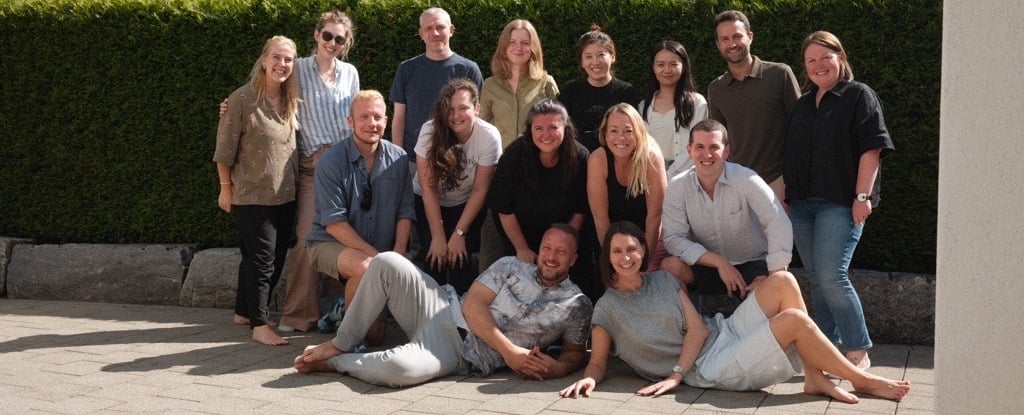
The aim was to align the Corporate Marketing strategy with MDPI's goal of becoming the world's most trusted OA publisher. While we provide a high-level publishing experience for our authors, as seen from our surveys, we need to keep building on our transparent and open communication to foster trust within the scholarly community and continue enhancing our reputation.
The Corporate Marketing team plays an important role as the mouthpiece for all our major activities within MDPI, especially those that model what it means to be a trusted partner. The purpose of the strategy meeting was to develop a feeling of trust in one another and an understanding of how to inspire trust in the stakeholders with whom we interact.
“We need to keep building on our transparent and open communication to foster trust within the scholarly community”

We conducted a set of activities to facilitate that sense of mutual trust and trustworthiness. Examples of some activities we worked on during this strategy-building event include:
- Exploring what trust means
- ‘Letter to self’
- ‘The brand I most trust’
- Most Trusted Academic Publisher
- ‘The brand I would like MDPI to become’
- ‘The 2029 MDPI Annual Report’
- Voice of Customer and Share of Voice – survey/data update on MDPI Brand Experience and Brand Perception
- Integrate Trust-Based Objective into Marketing Plan
- ‘Becoming the MDPI experience’
- ‘Trusting the next steps’
While two days is not enough to finalize a marketing strategy, it is sufficient to get everyone who attended into the mindset of the direction in which we are working. From here, we will develop a program with next steps on main projects, update communications, and collaborate with team leads to incorporate this approach into our work going forward.
As a marketing team, we can communicate our messages, but trust has to be built at every touchpoint in the stakeholder journey. Just talking about it isn’t enough. We need to be about it. That’s a role each of us plays, from editorial to IT, from marketing to HR. We must build trust from the inside out. It starts with each manager and resonates out via every team member.
As a company, our goal is to give all stakeholders with whom we interact – whether internal or external – the experience of working with an organization it can trust.
Coming Together for Science
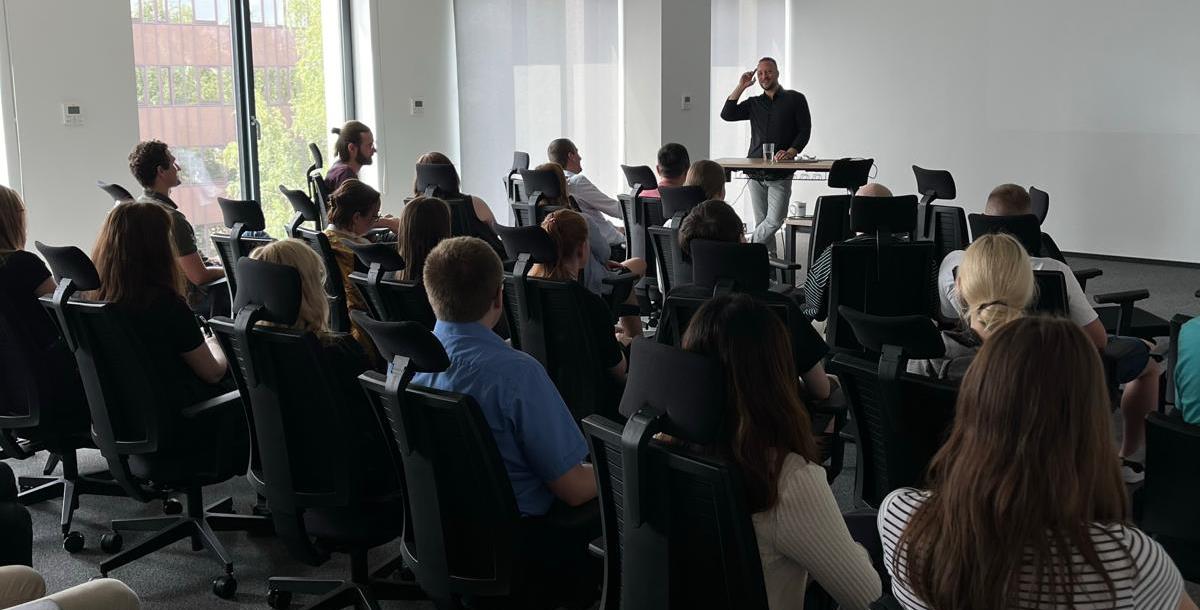
MDPI in Poland: Krakow Office
In July, I had the pleasure of visiting our Krakow office, following my recent trip to Warsaw to meet with the Polish Ministry of Science and Higher Education.

During these visits, I prioritized meeting with our Office Manager, Editorial Director, Group Leads, and members from various teams, including editorial, production, marketing, and journal relationship specialists, to understand their roles and current challenges. Instead of a formal presentation, I opted for an open discussion, sharing updates from headquarters to engage with colleagues in a more personal way.
Our Krakow office has many things to be proud of, including a large number of PhD colleagues (over a third of its staff holds a PhD degree). Krakow provides an opportunity for expanding beyond the 100 colleagues we currently have, by adding new hires in departments including editorial, production and marketing, among others.
About our Krakow office
- Opened in 2020
- 99 staff members as at 1 August 2024
- Main Departments include Editorial, Production, English Department, JRS, PR
Our Krakow office participates in international conferences, conducts author trainings and scholar visits, and engages in local market outreach. The office is also a member of the Polish Chamber of Commerce for High Technology (IZTECH) and is working on expanding its local engagement.
Krakow is the second-largest city in Poland, with a population of about 800,000. It also has a large student population of around 128,000, with seven universities. This means that roughly one in every eight residents is a student.
Poland and MDPI

Poland is a crucial market for MDPI. From 2020 to June 2024, Poland ranked 7th in submissions and 5th in publications for MDPI research articles. As at 31 July 2024, Poland ranks 7th in total MDPI publications, with approximately 70,000 research papers.
Between 2020 and June 2024, 61,500 authors from Poland published with MDPI. As at 30 June 2024, there are 1,205 active Editorial Board Members (EBMs) from Poland, with 661 EBMs (55% of the total) having an H-index over 25.
We also have four Editors-in-Chief (EiC) from Poland leading our journals: Coatings, Venereology, Advances in Respiratory Medicine, and Limnological Review, along with six Section EiC.
In 2023, we received approximately 21,000 submissions from Polish-affiliated authors, of which 12,032 were published.
“Poland is a crucial market for MDPI”
Meeting with Ministry of Education

On 22 July, we visited Warsaw to meet with the Polish Ministry of Science and Higher Education.
We were pleased to learn that they are strong supporters of the OA publishing model and value MDPI’s approach to the peer-review process, including our high ethical standards for quality control.
In 2023 Polish authors predominantly published their papers in OA, with MDPI holding the largest market share in OA publications within the country.
Our commitment to collaborating with Polish institutions is evident through our 33 Institutional Open Access Program (IOAP) agreements with prestigious institutions such as the University of Warsaw, the University of Wroclaw, the Jagiellonian University, and Gdańsk University of Technology. Through IOAP discounts, a healthy waiver rate, and our peer-review voucher system, we provide the Polish scholarly community with significant savings in OA publishing. The Minister greatly appreciated these efforts and our commitment to offsetting some of the APC costs.
We discussed industry concerns about the threat of papermills and presented the preventive measures MDPI has in place to mitigate this risk and uphold high ethical standards. We informed them of our commitment to combating papermills, including our involvement with United2Act and the STM Research Integrity Hub, as well as our efforts to expand our research integrity team and explore proactive measures.
Closing Thoughts

MDPI Thought Leadership Op-ed on Open Access is Now Live on Politico
I am pleased to share that our thought leadership Op-ed piece on Open Access (OA) is now live on Politico. This is a nice push for continued influence and support of OA among policymakers and industry leaders.
Why Politico?
Politico's reputation as a highly credible and influential news platform makes it an important venue to reach key opinion leaders (KOL) from academia, policymakers, and thought leaders from many industries. This visibility helps promote the OA philosophy.
Open Access: A Moral Imperative for Progress
In this piece, I discuss the necessity of making scientific research freely available to all. I argue that publicly funded research should be publicly accessible, highlighting how OA democratizes scientific knowledge, accelerates research availability, and fosters collaboration.
“Open Access is a fundamental right for all citizens”
Democratizing scientific communication
The impulse to democratize scientific communication is nothing new. OA may seem like a recent innovation, but its principles have historical roots traceable to Europe in the 15th century. Just as the printing revolution accelerated the dissemination of new ideas, OA publishing unlocks new scientific insights that would otherwise only be accessible to a few.
Benefits for scholars: amplifying impact through Open Access
Authors publishing in an OA journal can expect more citations of their work, increasing its potential impact. Research findings that are freely available are more likely to be cited than those hidden behind a paywall. Freedom of access greatly increases the potential audience for each paper, fostering a sense of community among researchers worldwide. Heightened visibility can attract prospective collaborators and employers for young scientists. At MDPI, we believe that all these factors can only accelerate the advance of science. Additionally, authors retain copyright in their work instead of signing it away, permitting broader dissemination under Creative Commons licenses and increasing its capacity for impact.
The moral imperative
OA is not just a matter of scientific policy; it is a fundamental right for all citizens and a prerequisite for a brighter, more informed future. Publicly funded research should be a top priority, and I am pleased to see policy moving in this direction. Our capacity to generate transformative scientific insights has to be democratized. The question today is no longer whether we can afford to embrace OA; rather, it is whether we can afford not to.
Chief Executive Officer
MDPI AG
2 August 2024
MDPI Romania Author Training Sessions in May
In May, MDPI Romania held three author training sessions – one endorsing an external event and two stand-alone sessions.
The National Session of Scientific Student Communications took place at Technical University Cluj on 17 and 18 May 2024. MDPI Romania sponsored this event and contributed an author training session on the production of research papers and case study analyses. JRS Norbert Kiss gave a presentation called The World of Open Access to explain different open access publishing models and the benefits of open access publishing. His presentation highlighted the impact of open access publishing on scientific progress and innovation.
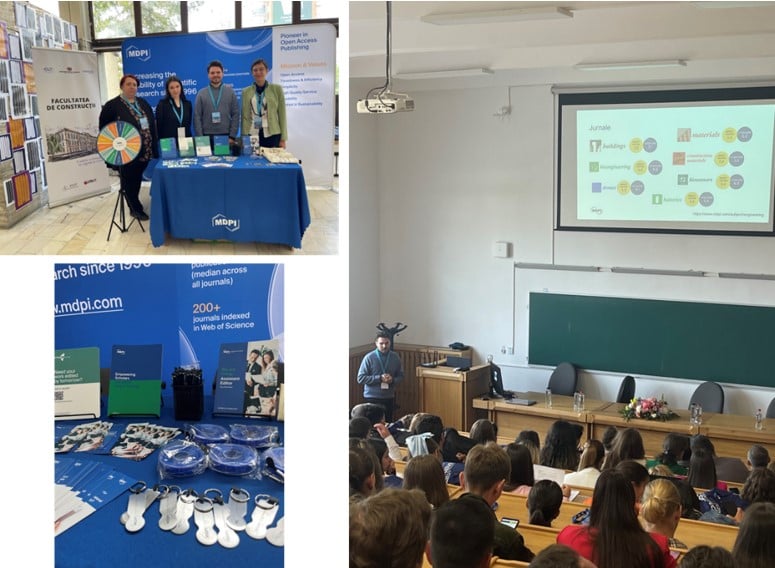
On 29 May 2024, MDPI Romania hosted an author training session for Ph.D. students, early career researchers, and professors at the Carol Davila University of Medicine and Pharmacy. In collaboration with Prof. Andreea Arsene, JRS Ioana Paunescu prepared two presentations: The Steps of the Publishing Process and Elaboration of a Peer Review Report. In her first presentation, she delved into MDPI’s history and mission, MDPI’s editorial process, and MDPI journals of various scopes that are accepting submissions. Her second presentation outlined the types of peer review, the contents of a peer review report by an MDPI reviewer, and the responsibilities of an MDPI reviewer.
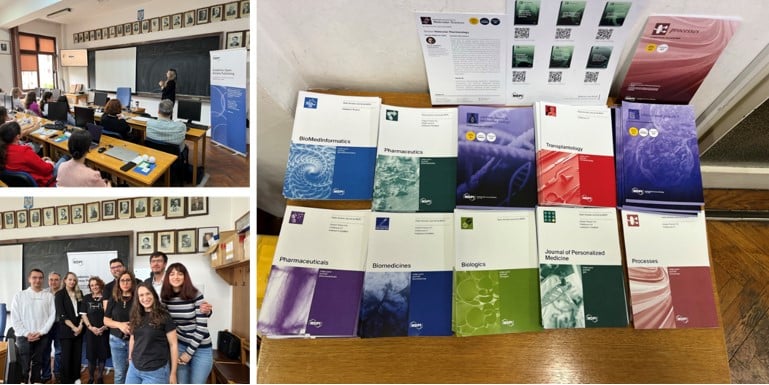
MDPI Romania also hosted an author training session at the Iasi University of Life Sciences on 29 May 2024. JRSs Laurentiu Preda and Cosmin Artan gave four presentations: Efficient Writing of an ISI-Indexed Scientific Article, Benefits of Publishing in the Open Access Model, Various Methods of Open Access Publishing, and MDPI Guide for the Article Review Process. The first three presentations offered guidance on how to improve academic writing, the fourth focused on how to write peer review reports. A highly interactive discussion followed the presentations, during which the JRSs provided extensive answers to attendees’ questions.
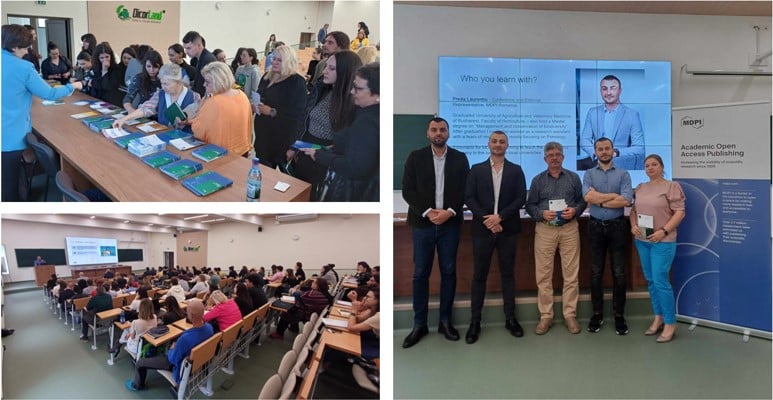
MDPI is grateful for all the attendees, speakers, and organizers involved in these events. Through their enthusiasm and dedication, these events were great successes.
1 August 2024
Recruiting Early Career Editorial Board Members for Conservation
In order to further enhance the international influence of the journal Conservation (ISSN: 2673-7159), promote the academic exchange of young scientists, and support the Editorial Board with additional talent, the first Early Career Editorial Board of Conservation (2024–2025) is being set up, and outstanding young scholars are invited to join!
Application Eligibility:
- Significant research achievements in the field of biodiversity and environmental conservation, resource recycling conservation, sustainable conservation management, conservation planning and governance, conservation ethics and ecology, creative and multidisciplinary solutions for conservation and restoration, heritage conservation and restoration;
- Willing to spend enough time to contribute to the development of the journal with passion and enthusiasm;
- Scholars who preside over national-level scientific research projects and have overseas experience will be preferred;
- A minimum of 5 years after achieving their Ph.D.
Benefits of an Early Career Editorial Board Member:
- A certificate of appointment as an Early Career Editorial Board Member will be provided;
- The resumes of Early Career Editorial Board Members are publicized on journal media platforms to improve academic visibility;
- An opportunity to be promoted to Editorial Board Member based on contributions;
- The journal will regularly acknowledge those who participated in the peer-review process on the journal website;
- Opportunities to exchange ideas with internationally influential researchers in this field; opportunities to participate in or host annual meetings and online seminars organized by the Editor-in-Chief and Editorial Board Members.
Responsibilities of an Early Career Editorial Board Member:
- Publicizing and promoting the journal at academic conferences and among peers;
- Selecting high-quality articles and preparing bilingual media content for promotion;
- Reviewing at least four manuscripts per year;
- Inviting submissions from local and overseas world-leading scientists in respective research fields.
Applications:
- Please fill in the application form here.
- Please send the application form and your academic résumé to [email protected] with the subject of “Conservation Early Career Editorial Board Application + Name + Institute + Research Expertise”.
Application deadline: 31 December 2024.
Selection Process:
Initial screening of application materials → selection by the Editor-in-Chief and Editorial Board Members → email notification → issuing a certificate of appointment.
18 July 2024
Meet Us at the 14th European Conference on Ecological Restoration (SERE2024), 26–30 August 2024, Tartu, Estonia

MDPI will be attending the 14th European Conference on Ecological Restoration (SERE2024) in Tartu, Estonia, which will take place from 26 to 30 August 2024. Ecological restoration is a topic that holds a prominent place on both political and scientific agendas. The decline in biodiversity demands our urgent attention, and degraded ecosystems around the world require an effective and knowledge-driven path to recovery. The SERE2024 will cover topics ranging from the theory and practice of restoring various ecosystems (wetlands, grasslands, forests, rivers, agroecosystems, urban and marine ecosystems) to the socioeconomic and political contexts of ecological restoration.
The following MDPI journals will be represented:
- Diversity;
- Land;
- Animals;
- Clean Technologies;
- Conservation;
- Ecologies;
- Environments;
- Forests;
- Geosciences.
If you are attending the conference, please visit our booth. Our delegates look forward to meeting you in person and answering any questions that you may have. For more information about the conference, please visit the following link: https://sere2024.org/.
10 July 2024
MDPI's Newly Launched Journals in June 2024
 Five new journals covering multiple subjects have launched their inaugural issue in June 2024. We are excited to be able to share with you the newest research rooted in the value of open access.
Five new journals covering multiple subjects have launched their inaugural issue in June 2024. We are excited to be able to share with you the newest research rooted in the value of open access.
We would like to express our deepest appreciation to all the Editorial Board Members and each journal will ensure its high-quality output using excellent editorial and rigorous peer review processes, to ensure that the articles achieve high impact and visibility.
Please feel free to browse and discover more about the new journals below.
|
Journal |
Founding Editor-in-Chief |
Journal Topics (Selected) |
 |
Prof. Dr. Marco Ranucci, IRCCS Policlinico San Donato, Italy |
anaesthetic medications; blood and fluid management; pain management; critical care; critical illness | view journal scope | submit an article |
 |
Dr. Giovanni E. Cacciamani, University of Southern California, USA |
surgical/procedural complications; complications; perioperative adverse events; postoperative adverse events | view journal scope | submit an article |
 |
Prof. Dr. Gassan Hodaifa, Universidad Pablo de Olavide, Spain |
laboratory management; laboratory safety; protective equipment; laboratory problems and challenges; laboratory Innovation | view journal scope | submit an article |
 |
Prof. Dr. Jan S. Suchodolski, Texas A&M University, USA |
companion animals health and disease; veterinary care and nutrition; genetics and genomics; behavior and welfare; human-animal relations | view journal scope | submit an article |
 |
Prof. Dr. Pierfrancesco De Paola, University of Naples Federico II, Italy |
real estate appraisal; economic and financial valuation of real estate projects; sustainable real estate; housing and urban economics | view journal scope | submit an article |
We wish to thank everyone who has supported the development of open access publishing. You are welcome to send an application here, or contact the New Journal Committee ([email protected]) if you would like to create more new journals.
24 June 2024
Recruiting Editorial Board Members for Conservation

Conservation (ISSN: 2673-7159) is currently recruiting prestigious scholars from around the world to join the journal’s Editorial Board.
Conservation is an international, peer-reviewed, open access journal on the biological, environmental, sociological, ethical, economic, and other transdisciplinary dimensions of conservation. You can find out more about our leading Editorial Board Members by visiting the following link: https://www.mdpi.com/journal/conservation/editors.
As an Editorial Board Member, your main responsibilities are as follows:
- Pre-checking and making decisions on a number of manuscripts, based on your area of expertise;
- Acting as, or recommending, a Guest Editor for a Special Issue on a topic related to your research interests;
- Helping to promote the journal among your peers or at conferences;
- Promoting Conservation and increasing its visibility on related academic social media sites.
The benefits of being an Editorial Board Member are as follows:
- The opportunity to publish one paper in Conservation free of charge per year;
- A certificate in recognition of your position;
- Additional sponsorship for conferences organized by the Editorial Board Members of Conservation;
- Travel grants for conferences that you attend or organize.
To apply for this position, recommend potential candidates, or request further information, please contact the Conservation Editorial Office ([email protected]) providing your full academic CV.
Conservation Editorial Office
20 June 2024
2023 Impact Factors for MDPI Journals Released

MDPI is pleased to announce the inclusion of 237 journals in the 2024 release of the Journal Citation Reports (JCR) and share the key results (see above).
This year, journals covered in the Emerging Sources Citation Index (ESCI) received category ranks together with journals in the Science Citation Index Expanded (SCIE) and Social Sciences Citation Index (SSCI). Overall, 139 MDPI journals indexed in ESCI are included in the new unified rankings for the first time.
Enhanced Comparability of Data
According to Clarivate, "the creation of unified category rankings [provides] a simpler and more complete category view for the evaluation of journal performance. [...] The category-first approach simplifies journal performance assessment with a holistic view of all journals in each subject category."
We are thrilled to announce that 72% of our ranked MDPI journals (171 of 237) are above average, in Q1 or Q2. Twenty-nine of our journals received their first Impact Factor this year, accounting for more than 5% of the journals accepted into the Web of Science last year.
MDPI Journals Ranked in JCR
The following data includes all MDPI journals indexed in SCIE, SSCI, ESCI and AHCI.
|
Journal |
Impact Factor |
Rank Quartile |
Category |
|
Q3 |
Acoustics |
||
|
Q2 |
Engineering, Mechanical |
||
|
Q2 |
Instruments & Instrumentation |
||
|
Q2 |
Management |
||
|
Q3 |
Respiratory System |
||
|
Q2 |
Engineering, Aerospace |
||
|
Q1 |
Agronomy |
||
|
Q2 |
Agricultural Engineering |
||
|
Q1 |
Agronomy |
||
|
Q1 |
Plant Sciences |
||
|
Q2 |
Computer Science, Artificial Intelligence |
||
|
Q2 |
Computer Science, Interdisciplinary Applications |
||
|
Q3 |
Computer Science, Artificial Intelligence |
||
|
Q2 |
Computer Science, Theory & Methods |
||
|
Q1 |
Agriculture, Dairy & Animal Science |
||
|
Q1 |
Veterinary Sciences |
||
|
Q1 |
Infectious Diseases |
||
|
Q1 |
Pharmacology & Pharmacy |
||
|
Q3 |
Immunology |
||
|
Q1 |
Biochemistry & Molecular Biology |
||
|
Q1 |
Chemistry, Medicinal |
||
|
Q1 |
Food Science & Technology |
||
|
Q2 |
Chemistry, Multidisciplinary |
||
|
Q1 |
Engineering, Multidisciplinary |
||
|
Q3 |
Materials Science, Multidisciplinary |
||
|
Q2 |
Physics, Applied |
||
|
Q2 |
Computer Science, Information Systems |
||
|
Q2 |
Engineering, Electrical & Electronic |
||
|
Q2 |
Telecommunications |
||
|
N/A |
Humanities, Multidisciplinary |
||
|
Q3 |
Environmental Sciences |
||
|
Q3 |
Meteorology & Atmospheric Sciences |
||
|
Q3 |
Physics, Atomic, Molecular & Chemical |
||
|
Q1 |
Audiology & Speech-language Pathology |
||
|
Q1 |
Mathematics, Applied |
||
|
Q2 |
Electrochemistry |
||
|
Q2 |
Energy & Fuels |
||
|
Q2 |
Materials Science, Multidisciplinary |
||
|
Q2 |
Psychology, Multidisciplinary |
||
|
Q2 |
Food Science & Technology |
||
|
Q2 |
Computer Science, Artificial Intelligence |
||
|
Q2 |
Computer Science, Information Systems |
||
|
Q1 |
Computer Science, Theory & Methods |
||
|
Q2 |
Engineering, Biomedical |
||
|
Q1 |
Biology |
||
|
Q2 |
Biochemistry & Molecular Biology |
||
|
Q2 |
Medicine, Research & Experimental |
||
|
Q1 |
Pharmacology & Pharmacy |
||
|
Q1 |
Engineering, Multidisciplinary |
||
|
Q3 |
Materials Science, Biomaterials |
||
|
Q1 |
Biochemistry & Molecular Biology |
||
|
Q1 |
Chemistry, Analytical |
||
|
Q1 |
Instruments & Instrumentation |
||
|
Q2 |
Nanoscience & Nanotechnology |
||
|
Q3 |
Biotechnology & Applied Microbiology |
||
|
Q1 |
Ornithology |
||
|
Q3 |
Neurosciences |
||
|
Q2 |
Construction & Building Technology |
||
|
Q2 |
Engineering, Civil |
||
|
Q2 |
Materials Science, Multidisciplinary |
||
|
Q1 |
Oncology |
||
|
Q4 |
Cardiac & Cardiovascular Systems |
||
|
Q2 |
Chemistry, Physical |
||
|
Q2 |
Cell Biology |
||
|
Q1 |
Materials Science, Ceramics |
||
|
Q3 |
Materials Science, Multidisciplinary |
||
|
Q2 |
Engineering, Chemical |
||
|
Q3 |
Chemistry, Multidisciplinary |
||
|
Q2 |
Chemistry, Analytical |
||
|
Q2 |
Electrochemistry |
||
|
Q1 |
Instruments & Instrumentation |
||
|
Q2 |
Pediatrics |
||
|
Q2 |
Engineering, Environmental |
||
|
Q2 |
Environmental Sciences |
||
|
Q3 |
Green & Sustainable Science & Technology |
||
|
Q2 |
Meteorology & Atmospheric Sciences |
||
|
Q2 |
Medicine, General & Internal |
||
|
Q3 |
Clinical Neurology |
||
|
Q3 |
Neurosciences |
||
|
Q2 |
Materials Science, Coatings & Films |
||
|
Q3 |
Materials Science, Multidisciplinary |
||
|
Q2 |
Physics, Applied |
||
|
Q3 |
Chemistry, Physical |
||
|
Q2 |
Mathematics, Interdisciplinary Applications |
||
|
Q2 |
Computer Science, Interdisciplinary Applications |
||
|
Q3 |
Physics, Condensed Matter |
||
|
Q2 |
Biochemistry & Molecular Biology |
||
|
Q2 |
Dermatology |
||
|
Q3 |
Computer Science, Information Systems |
||
|
Q2 |
Computer Science, Theory & Methods |
||
|
Q2 |
Crystallography |
||
|
Q3 |
Materials Science, Multidisciplinary |
||
|
Q3 |
Biochemistry & Molecular Biology |
||
|
Q2 |
Oncology |
||
|
Q3 |
Computer Science, Information Systems |
||
|
Q2 |
Multidisciplinary Sciences |
||
|
Q2 |
Dentistry, Oral Surgery & Medicine |
||
|
Q3 |
Dermatology |
||
|
Q3 |
Endocrinology & Metabolism |
||
|
Q1 |
Medicine, General & Internal |
||
|
Q2 |
Medicine, Research & Experimental |
||
|
Q2 |
Biodiversity Conservation |
||
|
Q3 |
Ecology |
||
|
Q1 |
Remote Sensing |
||
|
Q3 |
Environmental Sciences |
||
|
Q3 |
Geosciences, Multidisciplinary |
||
|
Q3 |
Ecology |
||
|
Q3 |
Economics |
||
|
Q2 |
Economics |
||
|
Q1 |
Education & Educational Research |
||
|
Q2 |
Computer Science, Information Systems |
||
|
Q2 |
Engineering, Electrical & Electronic |
||
|
Q2 |
Physics, Applied |
||
|
Q3 |
Energy & Fuels |
||
|
Q2 |
Physics, Multidisciplinary |
||
|
Q2 |
Environmental Sciences |
||
|
Q3 |
Genetics & Heredity |
||
|
Q4 |
Critical Care Medicine |
||
|
Q4 |
Dermatology |
||
|
European Journal of Investigation in Health Psychology and Education |
Q1 |
Psychology, Clinical |
|
|
Q2 |
Biotechnology & Applied Microbiology |
||
|
Q2 |
Materials Science, Multidisciplinary |
||
|
Q2 |
Ecology |
||
|
Q1 |
Forestry |
||
|
Q2 |
Fisheries |
||
|
Q2 |
Marine & Freshwater Biology |
||
|
Q3 |
Mechanics |
||
|
Q3 |
Physics, Fluids & Plasmas |
||
|
Q1 |
Food Science & Technology |
||
|
Q2 |
Multidisciplinary Sciences |
||
|
Q1 |
Forestry |
||
|
Q1 |
Mathematics, Interdisciplinary Applications |
||
|
Q3 |
Energy & Fuels |
||
|
Q3 |
Engineering, Chemical |
||
|
Q2 |
Computer Science, Information Systems |
||
|
Q2 |
Astronomy & Astrophysics |
||
|
Q4 |
Economics |
||
|
Q4 |
Mathematics, Interdisciplinary Applications |
||
|
Q4 |
Social Sciences, Mathematical Methods |
||
|
Q3 |
Gastroenterology & Hepatology |
||
|
Q4 |
Gastroenterology & Hepatology |
||
|
Q1 |
Polymer Science |
||
|
Q3 |
Ethnic Studies |
||
|
Q4 |
Family Studies |
||
|
Q3 |
Sociology |
||
|
Q2 |
Genetics & Heredity |
||
|
Q2 |
Geosciences, Multidisciplinary |
||
|
Q3 |
Geriatrics & Gerontology |
||
|
Q2 |
Health Care Sciences & Services |
||
|
Q2 |
Health Policy & Services |
||
|
Q4 |
Hematology |
||
|
Q4 |
Hematology |
||
|
N/A |
Humanities, Multidisciplinary |
||
|
Q2 |
Multidisciplinary Sciences |
||
|
Q1 |
Horticulture |
||
|
N/A |
Humanities, Multidisciplinary |
||
|
Q2 |
Water Resources |
||
|
Q4 |
Immunology |
||
|
Q2 |
Infectious Diseases |
||
|
Q2 |
Computer Science, Interdisciplinary Applications |
||
|
Q3 |
Computer Science, Information Systems |
||
|
Q2 |
Construction & Building Technology |
||
|
Q2 |
Engineering, Civil |
||
|
Q2 |
Transportation Science & Technology |
||
|
Q2 |
Chemistry, Inorganic & Nuclear |
||
|
Q1 |
Entomology |
||
|
Q2 |
Business, Finance |
||
|
Q1 |
Biochemistry & Molecular Biology |
||
|
Q2 |
Chemistry, Multidisciplinary |
||
|
Q1 |
Genetics & Heredity |
||
|
Q1 |
Pediatrics |
||
|
International Journal of Turbomachinery Propulsion and Power |
Q2 |
Engineering, Aerospace |
|
|
Q3 |
Engineering, Mechanical |
||
|
Q2 |
Engineering, Multidisciplinary |
||
|
Q2 |
Computer Science, Information Systems |
||
|
Q2 |
Geography, Physical |
||
|
Q2 |
Remote Sensing |
||
|
Q2 |
Cardiac & Cardiovascular Systems |
||
|
Q1 |
Medicine, General & Internal |
||
|
Q2 |
Materials Science, Composites |
||
|
Q3 |
Developmental Biology |
||
|
Q1 |
Engineering, Biomedical |
||
|
Q2 |
Materials Science, Biomaterials |
||
|
Q1 |
Sport Sciences |
||
|
Q2 |
Microbiology |
||
|
Q1 |
Mycology |
||
|
Q3 |
Imaging Science & Photographic Technology |
||
|
Q1 |
Psychology, Multidisciplinary |
||
|
Q3 |
Engineering, Electrical & Electronic |
||
|
Q2 |
Engineering, Manufacturing |
||
|
Q1 |
Engineering, Mechanical |
||
|
Q2 |
Materials Science, Multidisciplinary |
||
|
Q1 |
Engineering, Marine |
||
|
Q2 |
Engineering, Ocean |
||
|
Q2 |
Oceanography |
||
|
Q2 |
Health Care Sciences & Services |
||
|
Q1 |
Medicine, General & Internal |
||
|
Q2 |
Computer Science, Information Systems |
||
|
Q2 |
Telecommunications |
||
|
Journal of Theoretical and Applied Electronic Commerce Research |
Q1 |
Business |
|
|
Q1 |
Toxicology |
||
|
Q2 |
Biodiversity Conservation |
||
|
Q2 |
Communication |
||
|
Q2 |
Environmental Studies |
||
|
N/A |
Language & Linguistics |
||
|
Q2 |
Linguistics |
||
|
Q1 |
Law |
||
|
Q1 |
Biology |
||
|
Q2 |
Management |
||
|
Q2 |
Operations Research & Management Science |
||
|
Q2 |
Engineering, Mechanical |
||
|
Q2 |
Computer Science, Artificial Intelligence |
||
|
Q2 |
Computer Science, Interdisciplinary Applications |
||
|
Q2 |
Engineering, Electrical & Electronic |
||
|
Q3 |
Engineering, Electrical & Electronic |
||
|
Q2 |
Engineering, Mechanical |
||
|
Q2 |
Chemistry, Inorganic & Nuclear |
||
|
Q3 |
Chemistry, Physical |
||
|
Q3 |
Materials Science, Multidisciplinary |
||
|
Q1 |
Chemistry, Medicinal |
||
|
Q1 |
Pharmacology & Pharmacy |
||
|
Q3 |
Chemistry, Physical |
||
|
Q2 |
Materials Science, Multidisciplinary |
||
|
Q1 |
Metallurgy & Metallurgical Engineering |
||
|
Q2 |
Physics, Applied |
||
|
Q2 |
Physics, Condensed Matter |
||
|
Q2 |
Mathematics, Interdisciplinary Applications |
||
|
Q1 |
Mathematics |
||
|
Q1 |
Medicine, General & Internal |
||
|
Q2 |
Chemistry, Physical |
||
|
Q2 |
Engineering, Chemical |
||
|
Q2 |
Materials Science, Multidisciplinary |
||
|
Q2 |
Polymer Science |
||
|
Q2 |
Biochemistry & Molecular Biology |
||
|
Q3 |
Materials Science, Multidisciplinary |
||
|
Q2 |
Metallurgy & Metallurgical Engineering |
||
|
Q3 |
Biochemical Research Methods |
||
|
Q3 |
Microbiology |
||
|
Q2 |
Chemistry, Analytical |
||
|
Q2 |
Instruments & Instrumentation |
||
|
Q3 |
Nanoscience & Nanotechnology |
||
|
Q2 |
Physics, Applied |
||
|
Q2 |
Microbiology |
||
|
Q2 |
Geochemistry & Geophysics |
||
|
Q2 |
Mineralogy |
||
|
Q2 |
Mining & Mineral Processing |
||
|
Q3 |
Engineering, Multidisciplinary |
||
|
Q4 |
Chemistry, Organic |
||
|
Q2 |
Biochemistry & Molecular Biology |
||
|
Q2 |
Chemistry, Multidisciplinary |
||
|
Q3 |
Computer Science, Artificial Intelligence |
||
|
Q2 |
Computer Science, Cybernetics |
||
|
Q3 |
Computer Science, Information Systems |
||
|
Q2 |
Chemistry, Multidisciplinary |
||
|
Q2 |
Materials Science, Multidisciplinary |
||
|
Q2 |
Nanoscience & Nanotechnology |
||
|
Q2 |
Physics, Applied |
||
|
Q2 |
Clinical Neurology |
||
|
Q3 |
Clinical Neurology |
||
|
Q4 |
Neurosciences |
||
|
Q4 |
Environmental Sciences |
||
|
Q2 |
Biochemistry & Molecular Biology |
||
|
Q2 |
Genetics & Heredity |
||
|
Q1 |
Nursing |
||
|
Q1 |
Nutrition & Dietetics |
||
|
Q3 |
Marine & Freshwater Biology |
||
|
Q3 |
Oceanography |
||
|
Q4 |
Optics |
||
|
Q3 |
Chemistry, Organic |
||
|
Q3 |
Astronomy & Astrophysics |
||
|
Q2 |
Physics, Nuclear |
||
|
Q3 |
Physics, Particles & Fields |
||
|
Q2 |
Microbiology |
||
|
Q2 |
Pathology |
||
|
Q3 |
Pediatrics |
||
|
Q2 |
Chemistry, Medicinal |
||
|
Q1 |
Pharmacology & Pharmacy |
||
|
Q1 |
Pharmacology & Pharmacy |
||
|
Q3 |
Pharmacology & Pharmacy |
||
|
Q2 |
History & Philosophy of Science |
||
|
N/A |
Philosophy |
||
|
Q2 |
Optics |
||
|
Q2 |
Physics, Multidisciplinary |
||
|
Q1 |
Plant Sciences |
||
|
Q3 |
Physics, Fluids & Plasmas |
||
|
Q1 |
Polymer Science |
||
|
Q1 |
Polymer Science |
||
|
Q2 |
Engineering, Chemical |
||
|
Q4 |
Materials Science, Biomaterials |
||
|
Q2 |
Biochemistry & Molecular Biology |
||
|
Q4 |
Psychiatry |
||
|
Q1 |
Information Science & Library Science |
||
|
Q3 |
Instruments & Instrumentation |
||
|
Q3 |
Materials Science, Characterization & Testing |
||
|
Q4 |
Quantum Science & Technology |
||
|
Q2 |
Geosciences, Multidisciplinary |
||
|
Q3 |
Chemistry, Multidisciplinary |
||
|
Q2 |
Green & Sustainable Science & Technology |
||
|
N/A |
Religion |
||
|
Q2 |
Environmental Sciences |
||
|
Q1 |
Geosciences, Multidisciplinary |
||
|
Q2 |
Imaging Science & Photographic Technology |
||
|
Q2 |
Remote Sensing |
||
|
Q3 |
Medicine, General & Internal |
||
|
Q4 |
Obstetrics & Gynecology |
||
|
Q4 |
Reproductive Biology |
||
|
Q2 |
Environmental Sciences |
||
|
Q3 |
Green & Sustainable Science & Technology |
||
|
Q2 |
Business, Finance |
||
|
Q2 |
Robotics |
||
|
Q3 |
Public, Environmental & Occupational Health |
||
|
Q3 |
Pharmacology & Pharmacy |
||
|
Q2 |
Chemistry, Analytical |
||
|
Q2 |
Engineering, Electrical & Electronic |
||
|
Q2 |
Instruments & Instrumentation |
||
|
Q3 |
Chemistry, Analytical |
||
|
Q2 |
Medicine, General & Internal |
||
|
Q3 |
Psychology, Multidisciplinary |
||
|
Q2 |
Social Sciences, Interdisciplinary |
||
|
Q2 |
Womens Studies |
||
|
Q1 |
Engineering, Electrical & Electronic |
||
|
Q1 |
Urban Studies |
||
|
Q2 |
Social Sciences, Interdisciplinary |
||
|
Q2 |
Sociology |
||
|
Q2 |
Soil Science |
||
|
Q3 |
Chemistry, Physical |
||
|
Q3 |
Materials Science, Multidisciplinary |
||
|
Q2 |
Sport Sciences |
||
|
Q4 |
Mathematics, Interdisciplinary Applications |
||
|
Q3 |
Statistics & Probability |
||
|
Q3 |
Chemistry, Physical |
||
|
Q3 |
Materials Science, Multidisciplinary |
||
|
Q4 |
Surgery |
||
|
Q2 |
Environmental Sciences |
||
|
Q2 |
Environmental Studies |
||
|
Q3 |
Green & Sustainable Science & Technology |
||
|
Q2 |
Multidisciplinary Sciences |
||
|
Q1 |
Social Sciences, Interdisciplinary |
||
|
Q1 |
Engineering, Multidisciplinary |
||
|
Q3 |
Telecommunications |
||
|
Q4 |
Hematology |
||
|
Q2 |
Radiology, Nuclear Medicine & Medical Imaging |
||
|
Q2 |
Environmental Sciences |
||
|
Q1 |
Toxicology |
||
|
Q2 |
Food Science & Technology |
||
|
Q1 |
Toxicology |
||
|
Q2 |
Infectious Diseases |
||
|
Q2 |
Parasitology |
||
|
Q1 |
Tropical Medicine |
||
|
Q2 |
Astronomy & Astrophysics |
||
|
Q2 |
Physics, Particles & Fields |
||
|
Q3 |
Environmental Sciences |
||
|
Q3 |
Environmental Studies |
||
|
Q2 |
Geography |
||
|
Q3 |
Regional & Urban Planning |
||
|
Q2 |
Urban Studies |
||
|
Q1 |
Immunology |
||
|
Q1 |
Medicine, Research & Experimental |
||
|
Q2 |
Engineering, Mechanical |
||
|
Q2 |
Transportation Science & Technology |
||
|
Q2 |
Veterinary Sciences |
||
|
Q3 |
Engineering, Mechanical |
||
|
Q3 |
Mechanics |
||
|
Q2 |
Virology |
||
|
Q2 |
Environmental Sciences |
||
|
Q2 |
Water Resources |
||
|
Q2 |
Economics |
||
|
Q2 |
Political Science |
||
|
Q1 |
Social Sciences, Interdisciplinary |
||
|
Q2 |
Engineering, Electrical & Electronic |
||
|
Q2 |
Transportation Science & Technology |
Source: 2023 Journal Impact Factors, Journal Citation Reports TM (Clarivate, 2024)
About MDPI
A pioneer in scholarly, open access publishing, MDPI has supported academic communities since 1996. MDPI is leading the transition to open science by making more research free and accessible to everyone. Over 3.5 million researchers have entrusted MDPI with publishing their scientific discoveries. MDPI’s editorial process is bolstered by a network of dedicated reviewers, a team of 6000 professional, well-trained staff members, and an in-house article submission platform that was designed to ensure efficient processes within its 440 fully open access titles.
17 June 2024
Meet Us at the XX International Botanical Congress—IBC 2024, 21–27 July 2024, Madrid, Spain

Conference: XX International Botanical Congress—IBC 2024
Organization: International Association for Botanical and Mycological Societies (IABMS)
Date: 21–27 July 2024
Place: FEMA Madrid, Avda del Partenón, 5. 28042 Madrid, Spain
MDPI journals will be attending IBC 2024 as exhibitors. This meeting will be held in Madrid, Spain, from 21 to 27 July 2024.
The IBC takes place every six years under the supervision of the International Association for Botanical and Mycological Societies (IABMS). Rooted in the tradition of systematic botany, the IBCs have enlarged their scope over more than a century to become an integrated forum for knowledge on the plant and mycological worlds. The topics include the following: systematics; phylogenetics; biogeography and evolution; ecology, environmental, and global change, including invasive species and plant-animal interactions; biodiversity and conservation; structure, physiology, and development, including evo-devo genetics, genomics, and bioinformatics; and plants and society.
The following MDPI journals will be represented:
- Plants;
- International Journal of Plant Biology (IJPB);
- Biology;
- Taxonomy;
- Agronomy;
- Diversity;
- Forests;
- Life;
- Ecologies;
- Journal of Zoological and Botanical Gardens (JZBG);
- Journal of Fungi (JoF);
- Conservation.
If you will be attending this conference, please feel free to start a conversation with us. Our delegates look forward to meeting you in person and answering any questions that you may have. For more information about the conference, please visit the following website: https://ibcmadrid2024.com/.
Go to page chevron_left 1 2 3 4 5 chevron_right last_page



